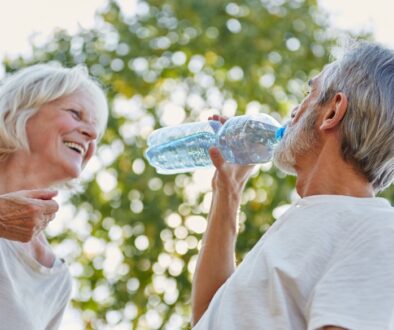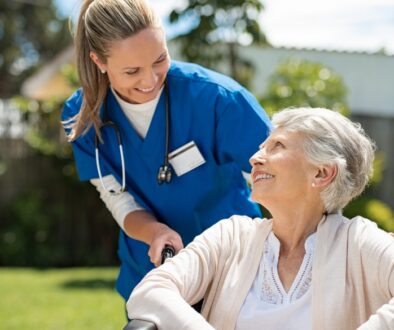Ways to Help the Elderly in Winter
Winter can bring many healthcare challenges for the elderly, especially those with mobility issues or those who are homebound. Ellen McCabe, director of professional education for HopeHealth, a non-profit healthcare organization providing medical care, care management, and support services in eastern Massachusetts, knows the dangers associated with winter weather all too well. “There are emotional risks, such as isolation from friends and community, and also physical risks, such as falls,” McCabe says. “Risks can be minimized if some basic guidelines are followed, making winter an enjoyable time of year for us all.”
Here are 10 tips for keeping aging loved ones safe and healthy during the winter months.
1. Stock emergency resources in their homes. “Emergency kits must be easily accessible and should include water, flashlight, batteries, radio, and blankets,” McCabe says. “The elderly should have at least a seven-day supply of prescription medications and a three-day supply of non-perishable food and water on hand.”
2. Watch the temperature. “For the elderly, there are significant risks of being too cold, which include dehydration,” she says. “People with cardiac issues tend to get colder faster. Make sure the home is properly insulated and windows are caulked to prevent drafts. Thermostats should be set to 68 degrees to prevent hypothermia and prevent pipes from freezing.”
3. Identify and eliminate fall risks (see more on this below). “This is a huge issue for the elderly and most do not know they are at risk for falls, especially during the winter. Often they will take off their wet boots when they get home and walk around the house in stockings, which often leads to slipping,” McCabe says. “Create slip-proof paths and make sure they wear shoes or slippers that grip. Keep driveways and walkways clear of snow. Many schools offer programs where student volunteers can help shovel and salt. The Snow Crew is one local organization that provides such volunteers.”
4. Eliminate potential fire risks. “Fires often start from things like overheating electric blankets or space heaters. Candles are always a risk, as well as drying Christmas trees,” she says. “Make sure smoke and carbon monoxide alarms are stocked with fresh batteries and are in good working order, and fire extinguishers are readily available near stoves and fireplaces.”
5. Encourage them to stay active and try safe exercises at home. “Many elderly feel lonely or inactive during this time of year but there are programs available to help. Many libraries deliver books and movies. Churches offer a visitation program of volunteers who provide companionship to housebound parishioners,” McCabe says. “Contact your local senior center for information on upcoming community activities. The Massachusetts Office of Elder Affairs website lists of all senior centers in the state.”
6. Practice safety precautions in the car. “If your elder loved one is still driving, be sure they have emergency snow supplies in their car, including heating packs, kitty litter or sand, emergency flares, and snow scrapers/brushes, water, and blankets, as well as a car phone charger,” McCabe says. “Make sure to keep the gas tank full. Ask your elder to let you know their destination, route and expected time of arrival before they leave the house.”
7. Keep a keen eye on their nutrition. “A balanced diet becomes even more crucial during the winter when we are less active, at risk of catching colds and lacking vitamin D. Be sure your loved one is getting balanced meals that incorporate vitamin-rich fruits and vegetables,” she says. “Keep extra food on hand in the freezer as well as bottled or canned fruit juices and non-fat milk powder.”
8. Establish a plan for winter emergencies. “If power is lost, do you and your elder know where they will go and what they will need? Have an emergency bag packed with a change of clothing and all medical and care necessities,” McCabe says. “Have a carrier ready in case pets need to be transported with them. Go to www.redcross.org to find shelters open in your area.”
9. Provide your elder with a cell phone that is easy to use. “Make sure the cell phone is always charged and has emergency contact numbers pre-programmed,” she says. “Ensure your elder has practiced using the dialing feature. Just Google ‘senior-friendly cell phone’ to see the range of options available with big buttons, easy viewing, and long-lasting batteries.”
10. Dress smart for cold weather. “It’s a good idea for the elderly to get out for some fresh air when possible,” McCabe says. “Layered loose-fitting clothing and water-proof gloves or mittens are best. Wearing a hat protects against heat loss, as close to half of the body heat is lost through the head.”
How to Help Your Aging Loved Ones Avoid Falls and Accidents Around the House
Living Room and Bedrooms:
- Remove clutter and electric cords from pathways and hallways
- Keep a portable phone by their chair, couch or bedside
- Make sure they have access to lighting when coming into and leaving hallways and rooms
- Place nightlights to light hallways and thresholds between rooms
- Place a piece of reflective tape on thresholds
- Ask them to sit at the bedside or edge of a chair for one minute before rising
- Make sure they keep assistive devices within arm’s reach. If assistance is needed for walking, a bell or wireless doorbell can be helpful to call for assistance
- Look into a personal alert system they can activate if they are not in reach of a phone
Stairs and Floors:
- Ensure they always wear shoes both inside and outside of the home and avoid walking with bare feet or socks
- Consider installing handrails on both walls of the stairwell for more convenient support
- Keep all stairwells well lit
- Install non-slip treads if stairs are not carpeted
- Move furniture if necessary so that all paths are clear
- Coil electric cords or tape them along the wall to keep pathways clear
- Tape down edges of carpets or remove scatter rugs
Bathrooms:
- Ensure easily accessed lighting and nightlights
- Consider installing grab bars and non-skid mats in and out of the tub
- Consider installing a raised toilet seat for ease of sitting and standing to provide additional support
- Consider a transfer or shower bench to ease fatigue during bathing or showering
- Make sure they avoid the use of bath oils or salts
Kitchen:
- Ask them to keep all cupboards and drawers closed to prevent bumping injuries
- Keep their soap and paper towels by the sink to prevent the spread of infection
- Place their electrical and flammable items away from the stove and sink
- To prevent dizziness, show them how to use care when bending from the waist to pick up items that have fallen
- Place their commonly used items on the counter where they can be easily assessed
Keep Up To Date On News and Blogs
Find all of The Neighbors of Dunn County’s current news here.
Source: Boston




